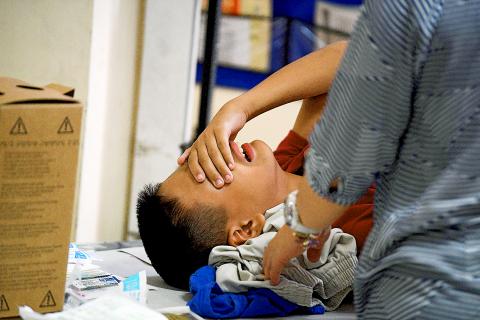A row of boys lying on newsprint-covered tables howl in pain and grit their teeth as part of “circumcision season” in the Philippines, when thousands of youngsters suffer through the procedure.
The removal of foreskins is a centuries-old rite of passage to adulthood in the nation, which has one of the highest rates of male circumcision in the world.
Yet even as circumcision comes under increasing scrutiny around the world, with critics branding it “child abuse,” it is rarely questioned in the Philippines and boys face tremendous pressure to undergo the procedure.

Photo: AFP
Every year, thousands of pre-teens from poor families go through the operation for free at government or community-sponsored clinics.
“I was shouting the whole time because it hurt so bad,” Vladimir Vincent Arbon said after his 20-minute ordeal.
“My mom told me that I need to get circumcised so I would grow taller and become a real man,” the 11-year-old added, expressing the pressure many youths face.
He was among 1,500 boys who underwent the procedure in one city near Manila, but the scenes are similar in clinics nationwide.
“To get circumcised is probably the essence of being a man ... for boys, circumcision is necessary to be called a man,” Joana Nobleza said after her 11-year-old son, Carlos, underwent the operation.
The boys, some with their parents, arrive before dawn typically in the months of April and May for an anxious wait in long lines — and then a sharp jolt of pain.
Many get local anesthetics, but for some the sensation is still intense. They are also provided with antibiotics to protect against any infections.
About 90 percent of males are circumcised for non-religious reasons in the Philippines, according to WHO data.
In towns across the nation, government and health workers convert classrooms, health centers or sports complexes into makeshift operating rooms where boys as young as nine take a number and wait their turn.
The pressure even manifests itself in the Philippine word for “uncircumcised,” which is a slur similar to coward.
“The term supot implies that one is different and a coward ... for lacking the courage to experience the pain and anxiety,” Romeo Lee of De La Salle University said in his research about the tradition.
The roots of circumcision in the Philippines can be traced back to the arrival of Islam in 1450, anthropologist Nestor Castro said.
However, even after the nation became majority-Christian under 300 years of Spanish colonial rule, the practice persisted as a cultural rite.
Male circumcision tends to be more common in nations with significant Muslim or Jewish populations, and less so in Catholic-majority nations.
In the past decade, the procedure has become increasingly controversial as the anti-circumcision movement has grown worldwide.
Critics consider it medically unnecessary and, as the majority of procedures are conducted in infancy, a violation of children’s rights as they are unable to give informed consent.
“I would assume 18 or 19-year-olds would have the wherewithal to do some research ... and consent only after much thought, but clearly a 10-year-old or an eight-year-old can’t do that and so ... it’s basically child abuse,” said John Geisheker, spokesman for US-based advocacy group Doctors Opposing Circumcision.
A decline in the number of children undergoing circumcision has been reported in the US, where historically the procedure has also been common.
There is evidence safe male circumcision reduces the risk of heterosexually acquired HIV in areas with epidemics, according to the WHO, which has included the procedure in some of its programs to tackle the virus in southern Africa.
However, Castro, believes removing the foreskin has a very specific value in Philippine culture.
“A circumcised lad is no longer treated as a young boy, and is now given more adult roles within family and society,” he said, adding that it is also important socially.
“A rite-of-passage is usually done collectively. There is always a group of boys who grow up together, enter school and get circumcised at the same time,” Castro said.
Prices for the surgery cost from US$40 and can cost as much as US$240 when performed in a hospital, the equivalent of a month’s pay for workers in the capital.
For boys in poor communities and their families, the free circumcision events sponsored by the government are the only option, but most go willingly and are proud to endure it.
“Going through the test of circumcision has made me a full-fledged adolescent,” 12-year-old Erwin Cyrus Elecanal said holding his hand protectively over his bandaged penis. “I will be more mature now and be helpful to my family.”

‘HYANGDO’: A South Korean lawmaker said there was no credible evidence to support rumors that Kim Jong-un has a son with a disability or who is studying abroad South Korea’s spy agency yesterday said that North Korean leader Kim Jong-un’s daughter, Kim Ju-ae, who last week accompanied him on a high-profile visit to Beijing, is understood to be his recognized successor. The teenager drew global attention when she made her first official overseas trip with her father, as he met with Chinese President Xi Jinping (習近平) and Russian President Vladimir Putin. Analysts have long seen her as Kim’s likely successor, although some have suggested she has an older brother who is being secretly groomed as the next leader. The South Korean National Intelligence Service (NIS) “assesses that she [Kim Ju-ae]

In the week before his fatal shooting, right-wing US political activist Charlie Kirk cheered the boom of conservative young men in South Korea and warned about a “globalist menace” in Tokyo on his first speaking tour of Asia. Kirk, 31, who helped amplify US President Donald Trump’s agenda to young voters with often inflammatory rhetoric focused on issues such as gender and immigration, was shot in the neck on Wednesday at a speaking event at a Utah university. In Seoul on Friday last week, he spoke about how he “brought Trump to victory,” while addressing Build Up Korea 2025, a conservative conference

DEADLOCK: Putin has vowed to continue fighting unless Ukraine cedes more land, while talks have been paused with no immediate results expected, the Kremlin said Russia on Friday said that peace talks with Kyiv were on “pause” as Ukrainian President Volodymyr Zelenskiy warned that Russian President Vladimir Putin still wanted to capture the whole of Ukraine. Meanwhile, US President Donald Trump said that he was running out of patience with Putin, and the NATO alliance said it would bolster its eastern front after Russian drones were shot down in Polish airspace this week. The latest blow to faltering diplomacy came as Russia’s army staged major military drills with its key ally Belarus. Despite Trump forcing the warring sides to hold direct talks and hosting Putin in Alaska, there

North Korea has executed people for watching or distributing foreign television shows, including popular South Korean dramas, as part of an intensifying crackdown on personal freedoms, a UN human rights report said on Friday. Surveillance has grown more pervasive since 2014 with the help of new technologies, while punishments have become harsher — including the introduction of the death penalty for offences such as sharing foreign TV dramas, the report said. The curbs make North Korea the most restrictive country in the world, said the 14-page UN report, which was based on interviews with more than 300 witnesses and victims who had